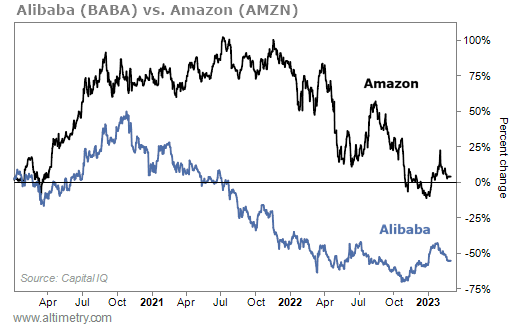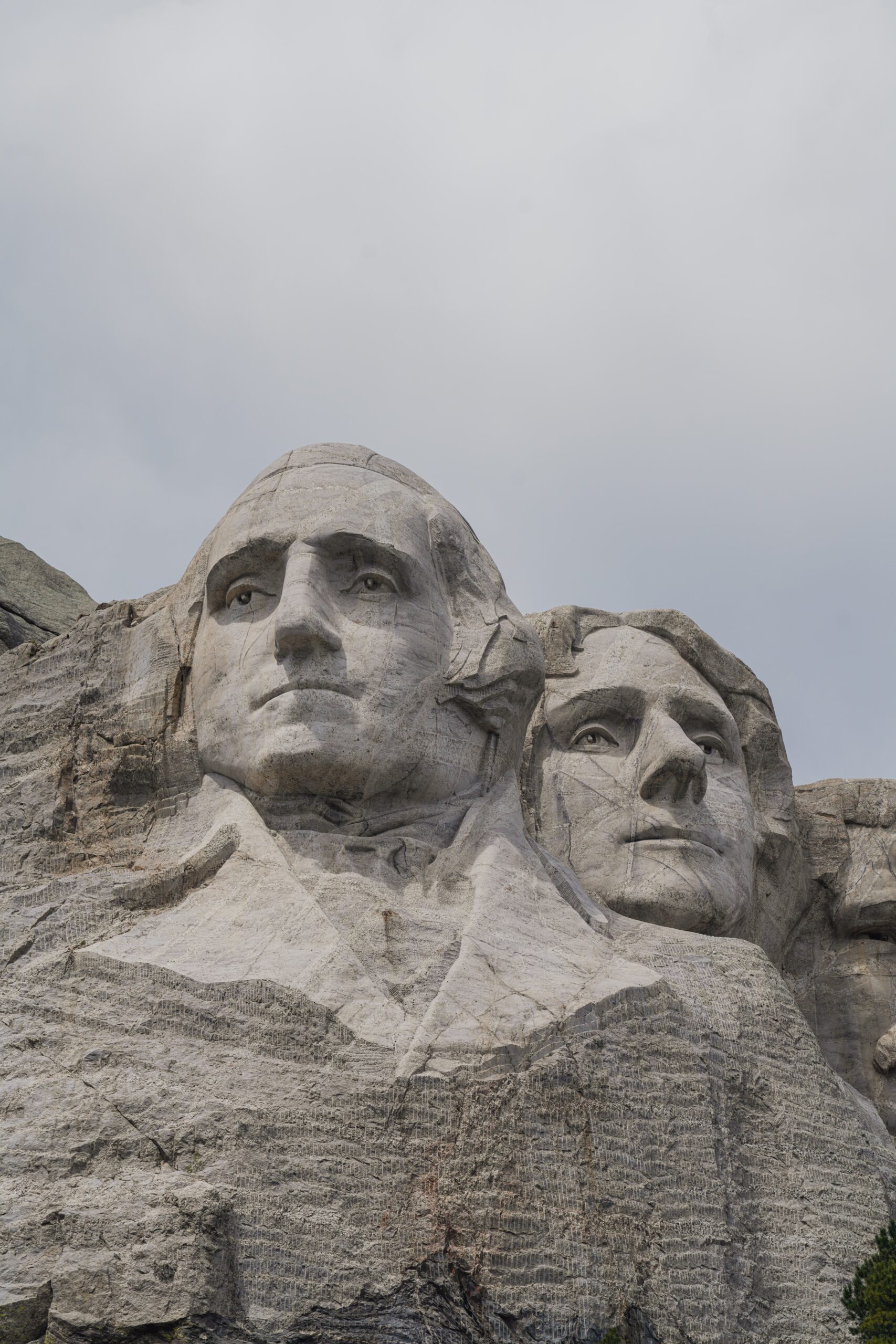 The unfortunate story of Jack Ma shows why the U.S. will continue to out-innovate China... and much of the world...
The unfortunate story of Jack Ma shows why the U.S. will continue to out-innovate China... and much of the world...
Growing up in China cost Jack Ma more than $100 billion.
As the founder of the colossal Chinese e-commerce business Alibaba (BABA), Ma should have a place on the Mount Rushmore of modern tech barons – alongside Amazon's (AMZN) Jeff Bezos and Tesla's (TSLA) Elon Musk.
Ma built successful, multibillion-dollar businesses in different industries. And like many of his peers, Ma's story has an appealing never-say-die quality...
As a young man, Ma failed his examinations for college entry. He was one of five people applying for a job at a police station. Four were hired... Not Jack Ma. He couldn't get a job as a hotel waiter. When 24 people applied to work at a KFC, 23 were hired... Not Jack Ma. He applied 10 times to Harvard University and never got in.
Despite that, he had the inspiration to create Alibaba. It became one of China's most successful and most innovative companies ever. By 2021, Ma's net worth peaked at nearly $50 billion.
Ma had dreams of innovating the Chinese banking system. He thought the financial-services industry was antiquated and needed a big change. So he founded Ant Financial in 2014 to do just that.
Ant aimed to dominate various financial products, including mobile payments. It did so successfully. In 2020, it looked like it was set to have the largest public stock offering in the world.
Ant's initial public offering ("IPO") would have set world records. It was set to raise $34.5 billion at a $313 billion valuation.
And Ma personally owned more than half the company. If the IPO succeeded, Ma would've been as rich as Bezos and Musk.
Had Jack Ma built his business empire in the U.S., this could've been just another example of successful entrepreneurism.
But that's not what happened. And as we'll explain today, Ma is a cautionary tale for investors who are looking at emerging international markets or who may be questioning if the U.S. can keep innovating like it has in the past.
 The Chinese government had other plans...
The Chinese government had other plans...
Ma angered the government overseen by Xi Jinping. He spoke out too much and too often about the problems with government regulators, state-owned banks, and how Chinese regulations were stifling innovation.
The Chinese government was not at all happy about that. It set out to dismantle Jack's reign. Just a few days prior to the Ant IPO, the government suddenly kiboshed it.
Then, Jack disappeared for months. My sources tell me that he was sequestered in a hotel room and not allowed to leave. It's similar to what just happened to Chinese financier Bao Fan, who disappeared for a month earlier this year.
Regardless of where Ma went, he even disappeared from his own TV show – which was similar to Donald Trump's Apprentice – and he missed the finale. On top of that, he missed several speaking engagements.
Meanwhile, Ant broke apart. Pieces were sold off for pennies on the dollar to many of the banks Ma had been speaking out against. In a twist of irony, the business was broken up on the auspices of "antitrust" regulations... while those pieces were basically handed to the existing oligopoly of old banks.
Ma was forced to step down from his leadership of Alibaba. A number of the company's initiatives were curtailed. And since then, Alibaba has been subjected to all kinds of fines and investigations. In 2021, it had to pay a record-breaking $2.8 billion anticompetitive fine. Ma's personal fortune is down to $23 billion... less than half what he was worth two years ago.
Rumors spread that Ma had been killed. Thankfully, he reappeared in person to squash those rumors. That hasn't stopped conspiracies that the resurfaced Jack Ma is a body double.
Once an eloquent and inspiring speaker, he no longer gives any interviews. Once hungry and ambitious with a flurry of startups and new innovations, including a university, he now seems to just travel on his yacht... popping up from time to time in various countries.
The Chinese government's re-education of Jack Ma is complete. He simply isn't the man he used to be.
 Too bad Jack Ma wasn't protected under the U.S. Bill of Rights...
Too bad Jack Ma wasn't protected under the U.S. Bill of Rights...
Ma's downfall was perhaps inevitable. Entrepreneurship and innovation require free thinking. Free thinking goes hand in hand with free speech. And that means open criticism and debate.
Yes, a giant reason why the United States of America has been an innovation juggernaut stems from the freedoms and protections of this constitutional republic.
The First Amendment guarantees this right to free speech and free thought for Americans. It helps explain the often-disruptive nature of American innovation. Jack Ma's silence today speaks volumes about the Chinese government's openness to disruptive innovation... It isn't.
U.S. regulators could never have the power to step in and sequester assets of companies the way the Chinese government charged after Alibaba and broke up Ant.
The Fourth Amendment prevents unreasonable searches and seizures, meaning Alibaba couldn't have been forced to sell pieces of Ant for huge discounts.
Likewise, the Fifth Amendment helps protect due process. In other words, the U.S. government couldn't hold Ma out of the public eye for months.
The fact is, monopolies simply don't innovate like startups. That's especially true for state-owned monopolies. So in the U.S., older firms will often be replaced by new ones over time. That's the nature of innovation and entrepreneurship, essentially protected by the Bill of Rights.
That's what has been stunting China's growth... and will continue to do so for decades to come. Jack Ma's experience is a cautionary tale. Any entrepreneur who hears it will think twice before doing anything truly disruptive.
 Meanwhile, those same entrepreneurs know the new U.S. venture ecosystem is the healthiest in the world...
Meanwhile, those same entrepreneurs know the new U.S. venture ecosystem is the healthiest in the world...
That's clear when you compare Alibaba with its American counterpart... e-commerce giant Amazon.
Jack Ma built Alibaba a few years after Jeff Bezos created Amazon. Both companies had a similar concept. They existed to sell a ton of stuff online. Both even worked at a massive scale for business-to-business purchases.
Here's the difference, though... In the past two years, Amazon has grown its businesses and disrupted all kinds of industries. And it's allowed to.
Amazon isn't just a marketplace anymore. It owns web services, retail (Whole Foods), health care companies (One Medical), a streaming business and movie producer (MGM), and a robotics company (iRobot).
Both Amazon and Alibaba are down from their recent highs. However, there's another key difference here...
Alibaba's stock is down more than 70% from its all-time high before the Ant IPO was canceled... and it was already down 62% before 2022.
Amazon was up slightly from the same day through the end of 2021. It only started to fall last year, when all the tech companies were hurting.
Take a look...

And here's a prediction that isn't terribly difficult to make... Amazon will recover, and then some. It's very possible that Alibaba will never bounce back.
 In short, governments can sway the outcome of your investments...
In short, governments can sway the outcome of your investments...
So when you're investing in companies from other markets, make sure you know the government's track record on business and innovation. Take a look at if laws are in place to protect free speech and to provide due process for companies and people alike. And make sure those governments stand by their laws.
By not doing so, you open yourself up to risk outside of just picking a bad company in a bad market.
The Dow Jones Industrial Average was 14,000 in October 2007. Now, it's almost at 33,000...
In contrast, the SSE Composite Index – which tracks all stocks traded on the Shanghai Stock Exchange – hit its all-time high of 6,000 in October 2007. Now, it flirts with 3,000.
China's government has been preventing and even punishing innovation for years. The U.S. has been encouraging it... and U.S. stocks have flourished.
That's why at Altimetry, we don't have faith in the long-term outlook for the Chinese stock... at least, not relative to the strength of the U.S. economic engine.
U.S. stocks will continue to prosper over the next few decades. That's where the bulk of your money should be invested.
Regards,
Joel Litman
March 3, 2023



 The unfortunate story of Jack Ma shows why the U.S. will continue to out-innovate China... and much of the world...
The unfortunate story of Jack Ma shows why the U.S. will continue to out-innovate China... and much of the world...


